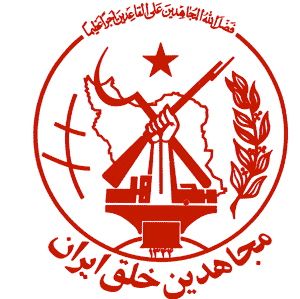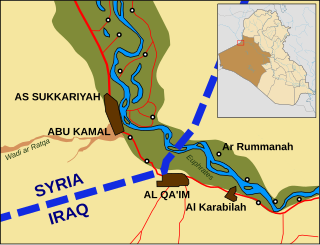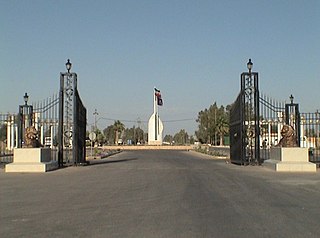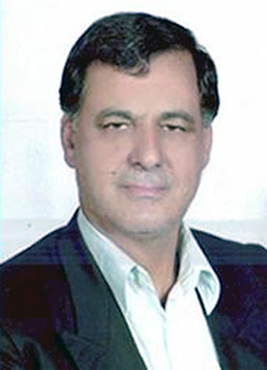
Tariq Aziz was an Iraqi politician who served as Deputy Prime Minister, Minister of Foreign Affairs and a close advisor of President Saddam Hussein. Their association began in the 1950s when both were activists for the then-banned Arab Socialist Ba'ath Party. He was both an Arab nationalist and a member of the Chaldean Catholic Church.

The People's Mojahedin Organization of Iran (PMOI), also known as Mojahedin-e-Khalq (MEK) or Mojahedin-e-Khalq Organization (MKO), is an Iranian dissident organization that was previously armed but has now transitioned primarily into a political advocacy group. Its headquarters are currently in Albania. The group's ideology is rooted in "Islam with revolutionary Marxism," but after the Iranian Revolution became about overthrowing the Government of the Islamic Republic of Iran and installing its own government. At one point the MEK was Iran's "largest and most active armed dissident group," and it is still sometimes presented by Western political backers as a major Iranian opposition group, but it is also deeply unpopular today within Iran, largely due to its siding with Iraq in the Iran–Iraq War.

Maryam Rajavi is an Iranian dissident politician and the leader of the People's Mujahedin of Iran (MEK), an organization advocating the overthrow of the Iranian government, and president-elect of its National Council of Resistance of Iran (NCRI). She is married to Massoud Rajavi, who is the co-leader of MEK.

A series of mass executions of political prisoners ordered by Ayatollah Khomeini and carried out by Iranian officials took place across Iran, starting on 19 July 1988 and continuing for approximately five months. The killings took place in at least 32 cities across the country, and estimates of the number killed range from 2,500 to 30,000, many of whom were also subject to torture.

International reactions to the 2006 Qana airstrike, which saw the greatest loss of civilian life in the 2006 Israel-Lebanon conflict, twenty eight deaths with thirteen missing, largely involved the condemnation of Israel by many countries around the globe, bringing about a supposed 48 hours cessation of air operations by the Israeli Air Force. Bombings resumed only a few hours after the start of the cessation of air operations.
On January 11, 2007, the United States military raided the Iranian Liaison Office in Erbil, Kurdistan Region, Iraq, ostensibly to detain two senior Iranian officials, but captured five mid-level diplomats instead. The U.S. government's position is that the office was used by the Iranian Islamic Revolutionary Guard Corps (IRGC) as a local headquarters. However, both Iranian and Kurdish officials state that it was a diplomatic mission in the city of Erbil.
Camp Ashraf or Ashraf City was a camp in Iraq's Diyala Governorate, having the character of a small city with all basic infrastructure, and headquarters of the People's Mujahedin of Iran (PMOI/MEK). The population used to be around 3,400 in 2012, but in 2013 nearly all were relocated to Camp Liberty near Baghdad International Airport after pressure by then-prime minister Nouri al-Maliki's office.

The 2008 Abu Kamal raid was an attack carried out by helicopter-borne CIA paramilitary officers from Special Activities Division and United States Special Operations Command, Joint Special Operations Command inside Syrian territory on October 26, 2008. The Syrian government called the event a "criminal and terrorist" attack on its sovereignty, alleging all of the reported eight fatalities were civilians. An unnamed U.S. military source, however, alleges that the target was a network of foreign fighters who planned to travel through Syria to join the Iraqi insurgency against the United States-led Coalition in Iraq and the Iraqi government.

Camp Liberty is a former installation of the United States Department of Defense in Baghdad, Iraq. The installation was used from 2012 to September 2016 to house members of the People's Mujahedin of Iran, who had been forcibly evicted from Camp Ashraf.
Reactions to the Gaza flotilla raid on 31 May 2010 ranged from fierce condemnation to strong support for Israel.
Events in the year 2011 in Iraq.

On April 8, 2011, the Iraqi Army launched a raid against the People's Mujahedin of Iran, an Iranian opposition group based at Camp Ashraf. 34 people were killed and 318 injured in the raid. The attack was denounced as a "massacre" by PMOI leader Maryam Rajavi and U.S. Senator John Kerry.
International reactions to the Syrian civil war ranged from support for the government to calls for the government to dissolve. The Arab League, United Nations and Western governments in 2011 quickly condemned the Syrian government's response to the protests which later evolved into the Syrian civil war as overly heavy-handed and violent. Many Middle Eastern governments initially expressed support for the government and its "security measures", but as the death toll mounted, especially in Hama, they switched to a more balanced approach, criticizing violence from both government and protesters. Russia and China vetoed two attempts at United Nations Security Council sanctions against the Syrian government.

Martin Kobler is a German former career diplomat who served as German Ambassador to Egypt, Iraq and Pakistan. He served as Special Representative of the United Nations Secretary-General and Head of United Nations Support Mission in Libya from November 4, 2015 to June 22 of 2017. Previously, he had served as Special Representative and Head of the UN Stabilization Mission in the Democratic Republic of Congo (MONUSCO) from June 2013 to 2015. In this capacity, he headed more than 20,000 peacekeepers in the country.
Abdolreza Rajabi was a Kurdish Iranian, born in Mahidasht District, west of the Kermanshah Province. He died under suspicious circumstances in Reja'i Shahr Prison where he was being held as a political prisoner. His was one of at least seven deaths in custody in as many years that has raised questions about the state of human rights in Iran.

On 14 August 2013, the Egyptian police, under the command of then-Defense Minister Abdel Fattah el-Sisi, used lethal force to “disperse” two camps of protesters in Cairo: one at al-Nahda Square and a larger one at Rabaa al-Adawiya Square. The two sites had been occupied by supporters of President Mohamed Morsi, who had been removed from office by the military a little over a month earlier following mass protests against his rule. Initiatives to end the six-week sit-ins by peaceful means had failed, and the camps were cleared out within hours.

On 23 July 2016, a twin bombing occurred in the vicinity of Deh Mazang square in Kabul, capital of Afghanistan, when Enlightenment Movement protesters, mostly from the Hazara ethnic group, were marching against a decision to bypass their region in the development of the TUTAP mega power project. At least 97 people were killed and 260 injured. The terrorist group Islamic State of Iraq and the Levant claimed responsibility, however the same group later on refused it. Some Hazara protestors allege that Afghan president Ashraf Ghani was behind the attack. They believe that Ashraf Ghani government was abetting the terrorists who were responsible for the attack. They also allege that the government officials were preventing the wounded from being shifted to the hospital.
National reactions to the Gaza flotilla raid on 31 May 2010 ranged from support to strong condemnation of Israel. Those supporting Israel generally also expressed concern for the loss of life and injuries to civilians. Criticism included the death and injuries of civilians, the disproportionate response, and the execution of the raid.

Ali Saremi was a political prisoner in Iran who was sentenced to death for co-operation with the Iranian opposition group People's Mujahedin of Iran (PMOI) and was hanged in Evin Prison on December 28, 2010. Saremi's torture and execution was covered in the press and brought international attention to the Human rights situation in Iran.











